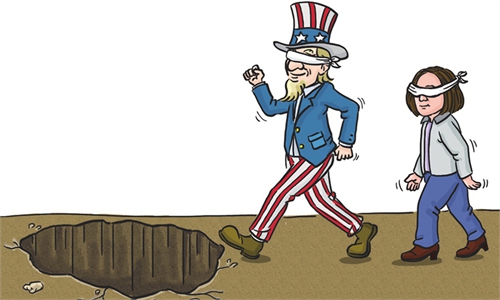
File Photo: VCG
From Thursday to Saturday, US Undersecretary of State Keith Krach will visit the island of Taiwan in the name of attending memorial for former Taiwan leader Lee Teng-hui. He is the highest-ranking State Department official to visit the island in 41 years.
This marks the latest US move to play the Taiwan card against the Chinese mainland, though the US has no qualms about upgrading its relations with the island. It indicates that Washington has disregarded the overall interests of China-US relations and its commitment to the Chinese government. China-US relations and cross-Straits relations will face new major challenges.
Taiwan has become the new battleground in the strategic game between China and the US. In recent years, under the banner of "America First" and slogans like "China is taking advantage of the US," US President Donald Trump has repeatedly set up obstacles on trade, science and technology, finance, people-to-people exchanges, the South China Sea, and Hong Kong to contain China.
Meanwhile, the Trump administration has failed to bring China to its knees, let alone bring China down. In this context, the US resorted to the Taiwan card.
As is well known to all, the Taiwan question is the most sensitive and core issue in China-US relations. In December 2016, US President Trump made an attempt to play the Taiwan card through a phone call with Taiwan leader Tsai Ing-wen before he took office. However, he maintained a relatively stable policy toward Taiwan before 2020.
Statements by senior US officials, arms sales and visits to Taiwan since this year show that the US has shifted its strategic focus to the Taiwan Straits.
The US has seriously undermined its strategic commitment to China. The foundation of China-US relations is the Three Joint Communiqués - the core of which is the Taiwan question. The US previously made a series of commitments to China regarding Taiwan, including that it will abide by the one-China principle and that it will not develop formal political relations with Taiwan. Moreover, US declared it would gradually reduce arms sales to the island.
In the past few years, those in the US breaking promises to China and violating the one-China principle have been its pro-Taiwan forces, including senators. This year, Trump joined this cabal. Since the second half of 2020, Trump has successively sent US Health and Human Services Secretary Alex Azar and Undersecretary of State Krach to the island. This demonstrates how the executive branch of the US is implementing its pro-Taiwan bill - the Taiwan Travel Act.
Washington's recent moves, such as selling 66 F-16 fighter jets and heavy weight torpedoes to Taiwan, illustrate that the Trump administration not only fails to comply with the joint communiqué issued by China and the US on August 17, 1982, but it also violates the Taiwan Relations Act issued by US Congress in 1979 that requires the US to have a policy to provide Taiwan defensive, not offensive, arms.
In other words, the executive branch of the Trump administration has gone much further than lawmakers in impairing China-US ties.
Krach's visit to Taiwan has been hyped up by Tsai authorities as a US reward to Tsai authorities for easing restrictions on imports of US beef and pork with clenbuterol, a banned substance. They see Krach's visit as a crucial step for the US to sign an economic and trade agreement with them.
However, Krach's visit to Taiwan is in the name of Lee Teng-hui's memorial service, which not only exposes US ulterior intentions but also greed.
By sending Krach to the island, the US wants to deliver a message that the US stands with the secessionist ideas represented by Lee Teng-hui.
After lifting US pork and beef import ban, Taiwan cannot make further concessions and Washington cannot gain more benefits. Therefore, the Trump administration decided to pile more pressure on Taiwan with Krach's absence of the economic dialogue. It reveals that the island is only a chess piece for the US to contain China and grab more profits.
The author is an associate research fellow of the Institute of Taiwan Studies, Chinese Academy of Social Sciences. opinion@globaltimes.com.cn

